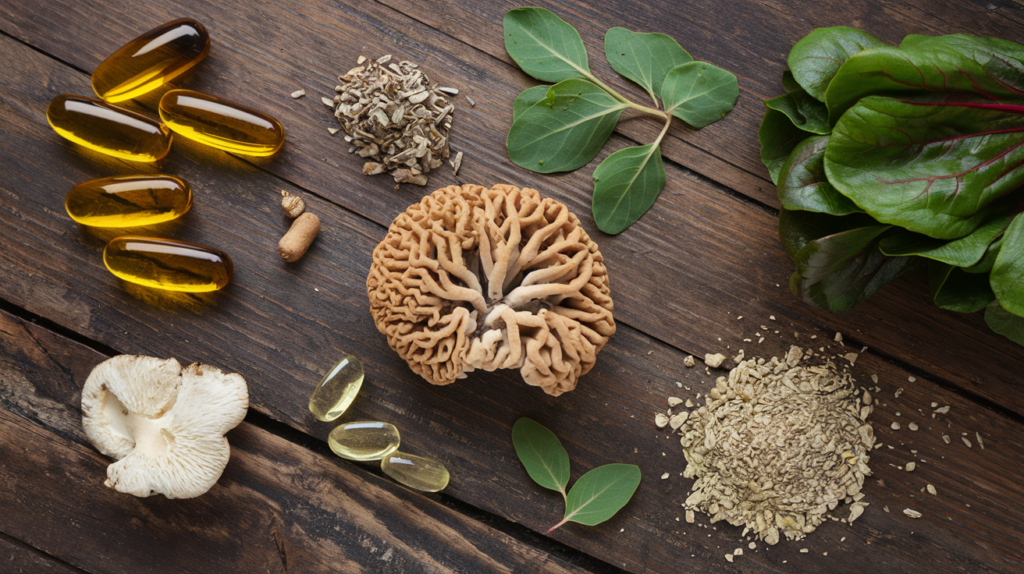In today’s fast-paced world, mental clarity, focus, and memory are more important than ever. Many people turn to brain health supplements, often referred to as nootropics, to sharpen their minds and improve cognitive performance. But do these supplements really work, and which ones are worth your time and money? Let’s explore the science behind brain health supplements and the most effective options available.
What Are Brain Health Supplements?
Brain health supplements are dietary supplements formulated to enhance cognitive functions such as memory, focus, creativity, and overall brain performance. They often contain natural ingredients like herbs, amino acids, and vitamins that are believed to support brain health and protect against cognitive decline.
How Do Brain Health Supplements Work?
The brain requires a steady supply of nutrients to function at its best. Factors like aging, stress, and lack of sleep can disrupt this, leading to cognitive sluggishness. Brain health supplements aim to:
- Improve blood flow to the brain.
- Support the production of neurotransmitters.
- Protect brain cells from oxidative stress and inflammation.
Top Ingredients in Brain Health Supplements
- Omega-3 Fatty Acids (Fish Oil)
- Found in fish oil, omega-3s like DHA and EPA are critical for brain health. They support cell membrane integrity and may reduce the risk of cognitive decline.
- Ginkgo Biloba
- Known for improving blood flow to the brain, Ginkgo Biloba may enhance memory and attention, particularly in older adults.
- B Vitamins
- Vitamins like B6, B9 (folate), and B12 are essential for maintaining healthy brain function and reducing homocysteine levels, which can negatively impact cognitive health.
- Bacopa Monnieri
- An ancient herb used in Ayurvedic medicine, Bacopa is believed to improve memory and learning by reducing anxiety and promoting neuron communication.
- Lion’s Mane Mushroom
- This medicinal mushroom may stimulate nerve growth factor (NGF), which helps regenerate neurons and improve cognitive functions like memory and focus.
- L-Theanine and Caffeine
- Often paired together, L-Theanine (an amino acid in tea) and caffeine can enhance focus and alertness without the jittery effects of caffeine alone.
- Rhodiola Rosea
- This adaptogen is praised for reducing mental fatigue and enhancing resilience to stress.
- Acetyl-L-Carnitine (ALCAR)
- ALCAR supports energy production in brain cells, potentially improving memory and focus.
Do Brain Supplements Really Work?
While some ingredients have solid scientific backing, brain health supplements are not magic pills. Their effectiveness often depends on factors like dosage, formulation, and individual biology. For best results:
- Choose supplements backed by clinical research.
- Pair them with brain-healthy habits like regular exercise, a balanced diet, and quality sleep.
Potential Risks and Considerations
Not all supplements are created equal, and some may contain fillers or unproven ingredients. To stay safe:
- Consult your healthcare provider before starting any supplement, especially if you take medications or have a medical condition.
- Look for products that are third-party tested for purity and potency.
How to Tell if a Vitamin is Good Quality
Choosing high-quality vitamins is essential for ensuring you’re getting the nutrients your body needs without unnecessary fillers or contaminants. Here are some tips and ways to evaluate a vitamin’s quality, including methods to test it:
1. Look for Third-Party Testing
Reputable brands often have their vitamins tested by independent laboratories to verify purity, potency, and safety. Look for certifications like:
- USP Verified (United States Pharmacopeia)
- NSF International
- ConsumerLab Seal
These certifications indicate the product meets strict quality standards and contains what it claims on the label.
2. Check the Label for Transparency
High-quality vitamins will clearly list:
- All active ingredients.
- Dosage amounts per serving.
- Any inactive ingredients or fillers.
Avoid products with artificial colors, preservatives, or additives.
3. Research the Brand
Choose brands with a reputation for quality and transparency. Look for companies that:
- Share their manufacturing processes.
- Provide detailed product testing information.
- Use Good Manufacturing Practices (GMP).
4. Assess Bioavailability
A good vitamin should be easily absorbed by the body. For example:
- Chelated minerals (like magnesium glycinate) are more bioavailable than non-chelated forms.
- Methylated forms of B vitamins (like methylcobalamin) are better for absorption, especially for people with certain genetic variations.
5. Test Your Vitamins at Home
While not a substitute for lab testing, these simple tests can give you a basic idea of quality:
- Dissolvability Test: Drop the vitamin in a glass of warm water and stir. It should dissolve within 30 minutes, indicating it’s likely to break down in your stomach.
- Acidity Test for Vitamin C: Dissolve the tablet in water and use pH strips to check the acidity; Vitamin C should register as acidic (around 3 on the pH scale).
6. Consult Reviews and Research
Read customer reviews and scientific research on the specific brand or product. Trusted health websites, forums, and review platforms can provide valuable insights.
7. Watch for Red Flags
Avoid vitamins that:
- Make unrealistic health claims (e.g., “cures all diseases”).
- Have no third-party verification.
- Are significantly cheaper than comparable products—this could indicate low-quality ingredients.
8. Seek Professional Guidance
A healthcare provider or nutritionist can recommend high-quality vitamins tailored to your needs. They can also provide advice on reliable brands and formulations.
Top Brain Supplements on the Market
Here are a few well-regarded options:
- Mind Lab Pro: A comprehensive nootropic with clinically researched ingredients.
- Nordic Naturals Omega-3 Fish Oil: A high-quality source of omega-3s.
- Neurohacker Collective’s Qualia Mind: Designed for advanced cognitive support.
- Genius Consciousness: Combines nootropics and adaptogens for mental clarity.
Conclusion
Brain health supplements can be a valuable tool for enhancing cognitive function, but they work best as part of a holistic approach to wellness. Prioritize a nutrient-rich diet, regular exercise, and stress management to give your brain the support it deserves.
What are your thoughts on brain health supplements? Have you tried any that made a difference? Let us know in the comments below!
